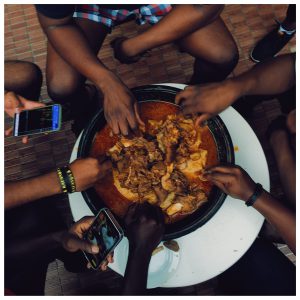This article is part of our four-part series on Black History Month. Read Kern Carter’s Introduction to Black History Month (don’t miss out on his mom’s amazing macaroni pie recipe!)
Born in Ghana, PK moved to South Africa with his family at five years old, where he lived until he was 15. The son of a diplomat, PK moved back and forth from Ghana and other places around the world, including time spent in China. His journey is one of venturing through foreign countries, rediscovering his own culture, and eventually finding himself in Canada. Here, PK shares his love for food and what it means to his Ghanaian roots.
PK has recently returned from a trip to his hometown in Ghana, and the smells and tastes are still fresh on his senses: “In African culture, everything revolves around food. Food is literally the heartbeat of society and brings everyone together. My cousins and I would sit together in a circle with one massive bowl and share from it.”
It took PK visiting Ghana again after a few years in Canada to realize how different the culture of food is in African countries compared to North America. For PK, it’s not a matter of good or bad or right or wrong, it’s more about celebrating the differences and understanding what makes each culture unique.
Two of the major differences that PK shared were the number of family members present at a meal and how long Ghanaians take to cook their meals. “I have nine uncles and aunts, and each of them have between two and four kids. At any given time, 20 people can roll up to the house,” he says.
PK says that cooking is an all-day thing and that it’s not strange for Ghanaians to spend six hours in the kitchen. A lot of that has to do with the fact that the core cultural dishes are soups and stews. Both of those meals take time to cook to get the flavours where they need to be.
Another reason for the extended cooking time is that Ghanaians almost always use fresh ingredients. “We barely refrigerate or reheat food,” PK says. “Outside of maybe freezing the stew or the soup, nine times out of ten, that food is gone.”
When we asked PK what his staple Ghanian dishes are, he didn’t hesitate at all. “Light soup. I don’t even know how to explain. You have not lived until you tried light soup.”
PK says you can make light soup with chicken or fish, but chicken is more typical. He also says they call it light soup because it’s much lighter than other local soups, such as palm oil soup or other nuttier type soups.
PK brings up another Ghanaian staple, kenkey, which is fermented corn typically served with different types of sauces. It’s the sauces that define whether or not the kenkey is tasty, and PK says the best sauces are the spicier ones.
“Shito is the main spicy sauce we eat with kenkey. You have not had spicy food until a Ghanaian blooded person has made you shito. You will not survive. To this day, my father can not eat my mother’s food,” he says.
PK’s Mom’s Light Soup Recipe
OK, we know that this is what you’ve been waiting for. Without further adieu, here is the recipe for light soup, sent directly from PKs mother. PK also asked me to include the caveat that his mother also does not measure her ingredients. Looks like Trinis and Ghanians have something in common 😉

Ingredients:
|
Directions:
|
| PK’s thoughts on Black History Month
Growing up, we didn’t really talk about race. It may have come up once or twice a year, like a footnote. But in America, it seemed like every second conversation was about race. That was a big culture shock to my system, but I learned from it. I come from a place where Black history is not just one month, it’s every second of every minute, of every hour of every day––every week, every month, every year. It’s nonstop. The best way to say it is, where I’m from, Black history is history. Period. When it comes to Black History Month, I think the awareness generated by the event is good. There is a time and a space where everybody stops and pays attention to a particular side of history. We could have a bigger conversation about how being Black has been defined. In North America, Black History really focuses on black American history. We need to know the facts and understand history, so we can have a productive discussion. |




